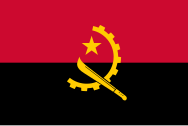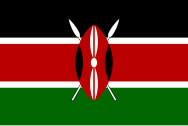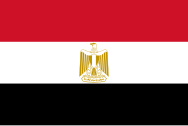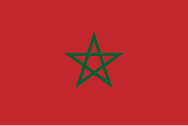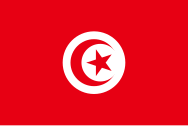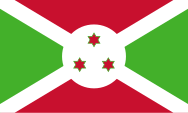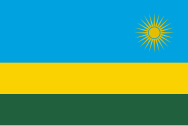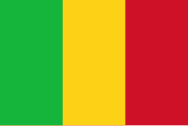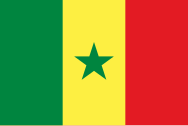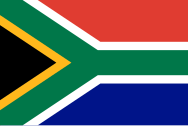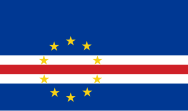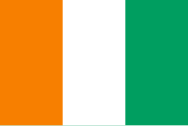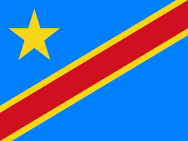- Tunisia - History
- Tunisia - Kingdoms
- Tunisia - Royal Archives
- Tunisia - Treaties
- Tunisia - Economy
- Tunisia - Technology
- Tunisia - Diaspora
- Tunisia - Culture
- Tunisia - Migration
- Tunisia - Museums
- Tunisia - Architecture
- Tunisia - Education
- Tunisia - Geneology
- Tunisia - Music
- Tunisia - Art
- Tunisia - Dance
- Tunisia - General
- Tunisia - People
Tunisia
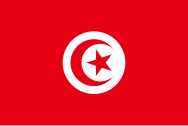
Country Flag
Tunisia, officially the Republic of Tunisia, is the northernmost country in Africa. It is a part of the Maghreb region of North Africa, bordered by Algeria to the west and southwest, Libya to the southeast, and the Mediterranean Sea to the north and east. Tunisia also shares maritime borders with Italy through the islands of Sicily and Sardinia to the north and Malta to the east. It features the archaeological sites of Carthage dating back to the 9th century BC, as well as the Great Mosque of Kairouan. Known for its ancient architecture, souks, and blue coasts, it covers 163,610 km2 (63,170 sq mi), and has a population of 12.1 million. It contains the eastern end of the Atlas Mountains and the northern reaches of the Sahara desert; much of its remaining territory is arable land. Its 1,300 km (810 mi) of coastline includes the African conjunction of the western and eastern parts of the Mediterranean Basin. Tunisia is home to Africa's northernmost point, Cape Angela. Located on the northeastern coast, Tunis is the capital and largest city of the country, which is itself named after Tunis. The official language of Tunisia is Modern Standard Arabic. The vast majority of Tunisia's population is Arab and Muslim. Vernacular Tunisian Arabic is the most spoken, and French also serves as an administrative and educational language in some contexts, but it has no official status.
Beginning in early antiquity, Tunisia was inhabited by the indigenous Berbers. The Phoenicians, a Semitic people, began to arrive in the 12th century BC, settling on the coast and establishing several settlements, of which Carthage emerged as the most powerful by the 7th century BC. The descendants of the Phoenician settlers came to be known as the Punic people. Ancient Carthage was a major mercantile empire and a military rival to the Roman Republic until 146 BC when it was defeated by the Romans who occupied Tunisia for most of the next 800 years. The Romans introduced Christianity and left architectural legacies like the Amphitheatre of El Jem. In the 7th century AD, Arab Muslims conquered all of Tunisia (finally succeeding in 697 after several attempts starting in 647) and settled with their tribes and families, bringing Islam and Arab culture to the local inhabitants. A later large-scale Arab migration of Banu Hilal and Banu Sulaym tribes in the 11th-12th centuries rapidly accelerated this process. By around the 15th century, the region of modern-day Tunisia had already been almost completely Arabized, establishing Arabs as the demographic majority of the population. Then, in 1546, the Ottoman Empire established control there, holding sway for over 300 years, until 1881, when the French conquered Tunisia. In 1956, Tunisia gained independence as the Tunisian Republic under the leadership of Habib Bourguiba with the help of activists such as Chedly Kallala, Farhat Hached, and Salah Ben Youssef. Today, Tunisia's culture and identity are rooted in this centuries-long intersection of different cultures and ethnicities.
In 2011, the Tunisian Revolution, which was triggered by dissatisfaction with the lack of freedom and democracy under the 24-year rule of President Zine El Abidine Ben Ali, overthrew his regime and catalyzed the broader Arab Spring movement across the region. Free multiparty parliamentary elections were held shortly thereafter; the country again voted for parliament on 26 October 2014, and for president on 23 November 2014. From 2014 to 2020, it was considered the only democratic state in the Arab world, according to the The Economist Democracy Index. After a democratic backsliding, Tunisia is rated a hybrid regime. It is one of the few countries in Africa ranking high on the Human Development Index, with one of the highest per capita incomes on the continent, ranking 129th in GDP per capita income.
Tunisia is well integrated into the international community. It is a member of the United Nations, Organisation internationale de la Francophonie, the Arab League, the Organisation of Islamic Cooperation, the African Union, the Common Market for Eastern and Southern Africa, the Non-Aligned Movement, the International Criminal Court, the Group of 77, among others. It maintains close economic and political relations with some European countries, particularly with France and Italy, due to their geographical proximity. Tunisia also has an association agreement with the European Union and has attained the status of a major non-NATO ally of the United States.


